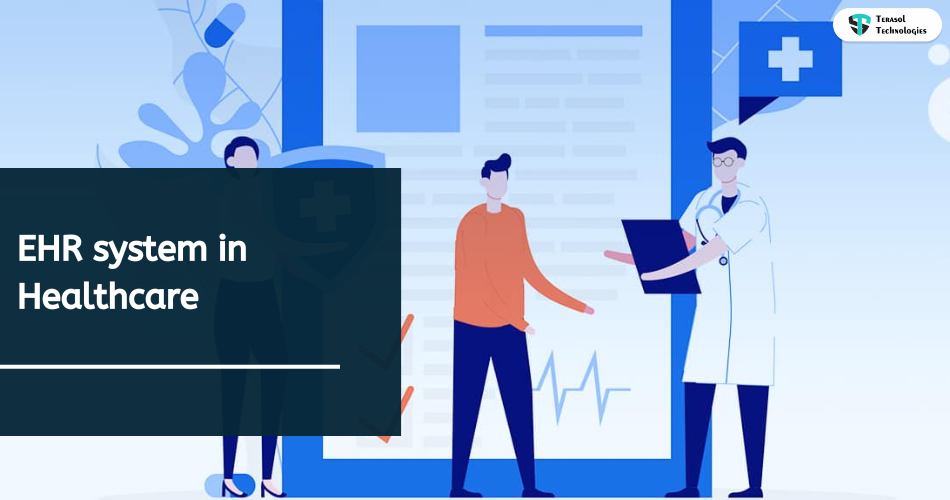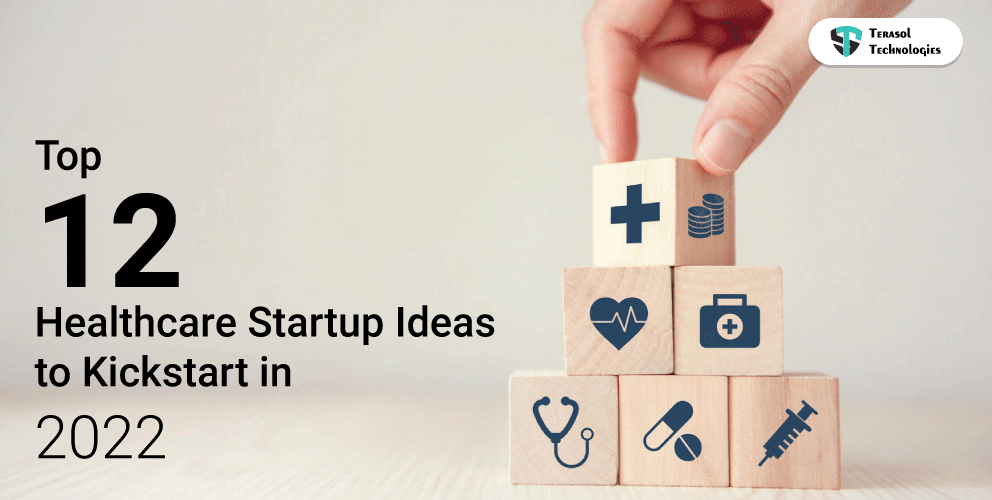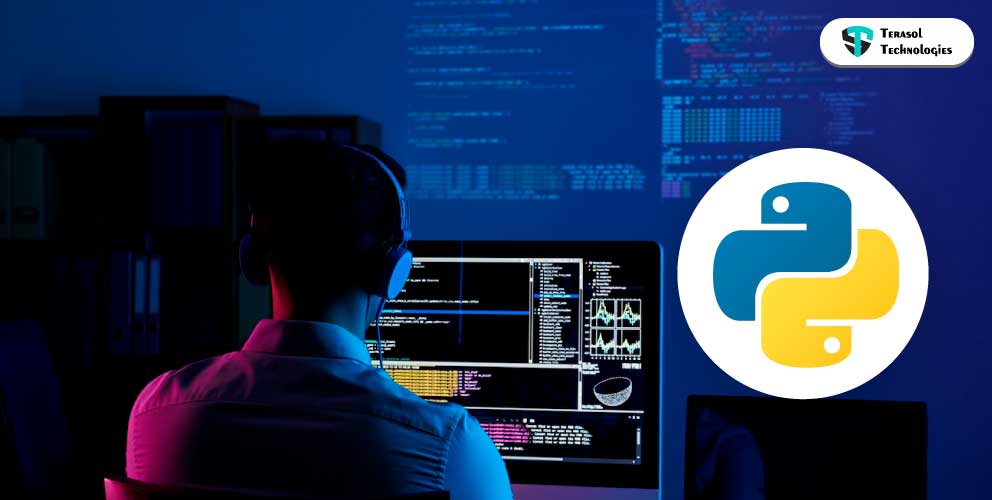Blockchain in Healthcare and its 6 Amazing Applications
The latter part of the twentieth century and the early years of the twenty-first century saw some significant breakthroughs and discoveries that profoundly changed our world. Whether it's the computer, the internet, or the latest craze, Blockchain, there's something for everyone.
In the tech industry, blockchain has become a new and trending term. The rise of Bitcoin and other cryptocurrencies has undoubtedly aided blockchain's climb to prominence. However, experts feel that Blockchain is not a fad because it promises to be much more than just cryptocurrencies.
What is Blockchain in Healthcare? Will Blockchain be able to revolutionalize the healthcare industries? Is there any scope for blockchain and healthcare?
With millions and billions of transactions per year, the healthcare industry is one of the largest in the world. The healthcare industry has seen complex and revolutionary changes in some areas, such as pharmaceuticals, treatments, vaccines, clinical trials, and cloud computing usage. Although it still requires massive redesigning in other areas.
By keeping the patient at the center of the medical ecosystem system, blockchain in healthcare can eliminate the difficulties afflicting this sector and transform it.
Blockchain combined with healthcare is a match made in heaven.
In the next few minutes, you will see how blockchain technology and healthcare fit into the puzzle together. Also, learn if there is any future scope and the Application of blockchain technology in healthcare.
So let’s start with why is blockchain such a big deal for the future.
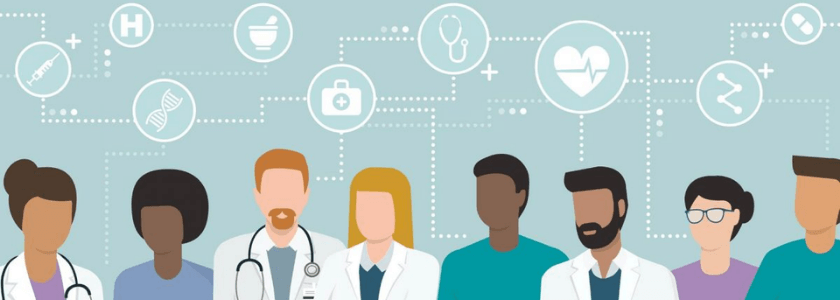
Why is Blockchain Technology such a Big Deal?
A blockchain is a decentralized database that is shared among computer network nodes. A blockchain acts as a database, storing information in a digital format. The word "blockchain" comes from the fact that "blocks" or transactions (records) are confirmed and linked to the preceding "block" to build a long chain.
In simple terms, think of blockchain as a giant Google doc file with one big difference: anyone may access and add to it, but not edit it.
Blockchain and Healthcare fit together by centralizing all of the stakeholders' data in one location for them to view and work with, changes made by one person in the data are available to everyone else in the system.
The characteristics of the Blockchain in Healthcare ecosystem combines to address a variety of current difficulties in the healthcare industry. Medical Blockchain is a game-changing invention and a big deal because it solves digital issues like:
Transparency: Because of the decentralized structure of blockchain, all transactions may be transparently seen by utilizing a personal node or blockchain explorers. It allows anybody to see transactions in real-time.
Security: Instead of a centralized database, data is kept across all systems in Blockchain, which improves security and makes it hack-proof.
Cost-efficient: One of the most cutting-edge technologies available today is blockchain technology. By allowing peer-to-peer transactions, blockchain in healthcare eliminates third parties and even banks, lowering transaction costs.
Immutability: Once data is entered into the blockchain, it cannot be changed by anyone. It aids people in demonstrating that their data is authentic and unaffected.
Interoperability of systems: Blockchain in healthcare provides a decentralized computer network and internet that spans geographical boundaries. Thus, when one health institution requests information about a patient from another, they no longer have to wait for the data to travel several miles.
Innovation: Blockchain provides a fantastic platform for new and innovative company models to grow and compete against traditional businesses.
Now we know why is blockchain a big thing.
The question arises is, how can Blockchain fit into the Healthcare Industry, given that it was designed to be a component of the payment ecosystem?
🔖Digitize your healthcare business with our cutting-edge life-science development services.
What is blockchain in healthcare? Is there any future scope?
The growing demand for integrated care delivery, along with a growing emphasis on health management, drives the need for an information technology ecosystem that eliminates the need for middlemen.
As an open decentralized system, blockchain in healthcare that underpins cryptocurrencies, does just that.
According to BlueWeave Consulting, the global blockchain technology in the healthcare market was valued at USD 129.22 million in 2020. And it is expected to grow at a CAGR of 68.13 percent to USD 4,720.96 million by 2027.
Companies in the healthcare industry are incorporating blockchain in healthcare to give a secure and trustworthy way of payment to their consumers without having to worry about the payment's integrity.
To express the obvious and incontrovertible reality that the medical profession is subjected to countless security breaches on a near-daily basis, it is a no-brainer to use this technology to close all of the gaps.
Furthermore, blockchain can be used for much more than this; for example, a blockchain-monitored health information exchange could unlock the true potential of interoperability. Its systems can reduce or eliminate the current middlemen's expenses and friction.
Blockchain in healthcare has a wide range of applications and implications for all parties involved. This technology can connect disparate systems, allowing for a more in-depth analysis of the value of individualized care too.
6 Amazing Applications of blockchain in healthcare
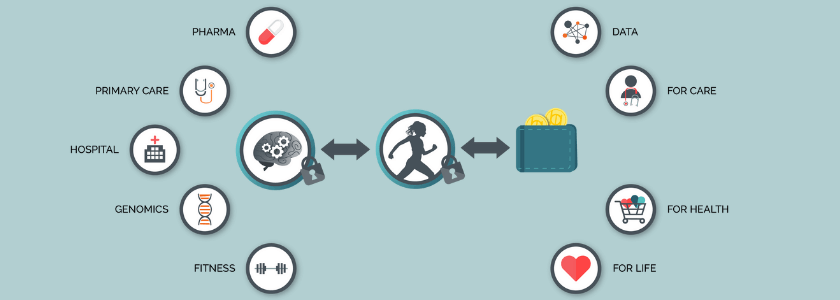
We now know there is immense scope of blockchain in healthcare. Here is the numerous application of Big Pharma.
Blockchain technology helps healthcare researchers uncover genetic code by facilitating the secure transfer of patient medical records, managing the drug supply chain, and facilitating the secure transfer of patient medical records.
Let's see them one by one.
1. Maintain Patient's Medical Records:
Assume you went to a doctor in 2010 for advice on a disease that was eventually treated, but the condition resurfaced in 2021, 11 years later.
Now you must locate the consulting physician and hope that he has the records.
(Too much work, isn't it!)
Just cut to the decentralized blockchain era, when Blockchain in Healthcare is the norm. You and your current doctor will have a thorough record of what you were affected from thanks to your healthcare app that has Blockchain capability built-in. Blockchain can also be used to ensure that all medical records are accurate.
2. Supply chain management (SCM)
The present healthcare supply chain is not secure and time-consuming. The medications are first made in the production centers. They are subsequently distributed to wholesale wholesalers, retailers, and eventually to customers.
To make matters worse, there's a serious threat to the pharmaceuticals' legitimacy, as substandard and counterfeit drugs can easily enter the system.
Blockchain in healthcare immutability can solve multiple challenges at once.
- Assuring that the active components employed in medication development meet medical requirements.
- Counterfeit medications can be tracked via blockchain: Healthcare and pharmaceutical companies can eliminate counterfeit pharmaceuticals by using blockchain technology.
- Pharmaceutical businesses, pharmacies, and healthcare professionals all benefit from information about the flow of drugs and inventories.
- It's also a lot easier to manage pharmaceutical and gadget recall.
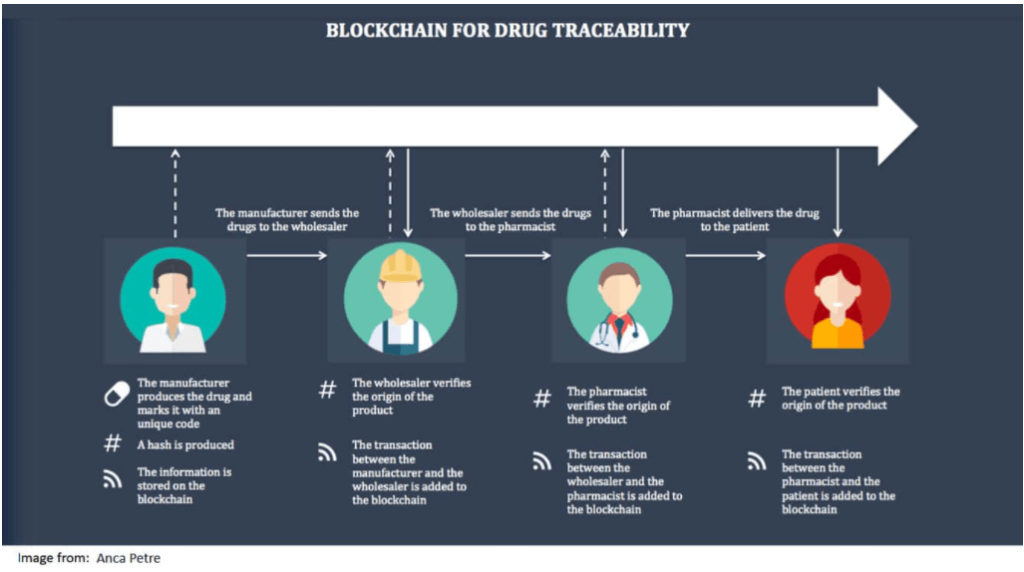
3. Clinical Research
Blockchain has the potential to be useful in medical research. The traceability of data collected during the clinical trial procedure is critical for evaluating the suggested medical therapies.
Suppose Blockchain in Healthcare are coupled in such a way that they are integrated with users' health-related IoT devices. One can get a full record of observational data and patient activities can be made. Such a study yields significant results, allowing for better drug composition that is more closely aligned with the particular needs of the consumers.
4. Treatment Regimen
Healthcare research organizations can evaluate the impact of a given treatment regimen on a big portion of a customer's population thanks to validated access to extensive patient data. This type of downstream research on the influence of a treatment regimen on a patient's well-being strengthens the foundation for continued intervention modification to fit the patient's unique characteristics.
5. Settelment Resolution
One of the things that irritate the healthcare business is the amount of time spent on claim settlements. The terms and conditions of the contract between the payer and the provider are defined using smart contracts on the blockchain in healthcare solutions.
6. Shift in the business model
When we integrate blockchain in healthcare processes with web application development companies, it can develop new business models.
Let's look at various examples of how blockchain affects stakeholder business models, such as Blockchain healthcare.
Pharmaceutical Companies - Pharma companies can give a variety of medical products and treatment regimens that are personalized based on the patient's exact genomic data obtained in real-time on the Blockchain platform.
Pharmacies- Blockchain in healthcare will make pharmacies' jobs easier because they will have access to all data. They can successfully guide the patients on how to take the medicine based on these facts.
Healthcare professionals- All healthcare workers, including doctors and nurses, have easy access to the patient's medical information. When combined with real-time data about a patient's health performance acquired from wearables, healthcare providers can use novel approaches to warn and counsel patients about potential health risks.
I'm sure that some of you reading this are enthusiastic about the possibilities for innovation that Blockchain in healthcare can offer to the world.
For a relatively untested technology like Blockchain to revolutionize an industry like healthcare, the concept that appears to provide a superficial promise of smoothing out the existing industry will have to overcome several ground-level difficulties. Below are a few.
Challenges of Blockchain in Healthcare
It will be difficult to apply a new technology like blockchain in healthcare on a significant scale. A few challenges blockchain could face are:
- Different geographical locations have different sets of medical guidelines.
- Uncertainty in determining who requires access.
- The maximum amount of data can be stored in a single block.
- If blockchain technology is used in the healthcare industry, all medical records, documents, photographs, and lab reports will be stored on it. The combined size of all of these files might easily exceed the storage capacity of current blockchain technology, posing a dilemma.
- There is currently no mechanism in place to determine who owns the healthcare data and who authorizes authorization to share it.
- There is no clear estimate of how much it will cost to set up and maintain blockchain technology in healthcare.
Wrapping Up
Blockchain is a very young technology that is still in its infancy. Its phenomenal success in the form of Bitcoin has undoubtedly upped the bar. We may see Blockchain affecting the healthcare business in the next years, increasing blockchain-based life-sciences solutions.
Whether you're just getting started with custom software development company or want to add a Blockchain feature to an existing Health app, the best course of action is to start small.
Medical Data Management, Claims and Billing Management, Data Security, and Medical Research are some of the healthcare app functions that can be moved to Blockchain.
If you believe your organization is ready to embrace change and accept cutting-edge concepts of Blockchain, feel free to get in touch with us.
